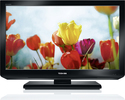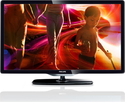HD-Ready, 50 Hz, LED-TV
No matter whether in the living-room, the sleeping-room or in the caravan, with the 32EL833 you can enjoy your favorite program anywhere. Digital dubletuner, two HDMI and a USB connection feature a variety of possibilities.
HD READY
A High Definition (HD) ready TV has a native resolution of 1366x768 pixels and a interlaced resolution of 1920x1080 pixel. He must provide a HDMI or DVI connection with HDCP (=copy protection) support. Furthermore he must be able to display HD-content from any HD-source.
LED PICTURE QUALITY
In LED televisions, LEDs (Light Emitting Diodes) are used for backlighting purposes. When LEDs are used in televisions, they vastly improve picture quality and lower power consumption.
HOW LCD SCREENS WORK
To understand the benefits of LEDs, one must first understand how an LCD (Liquid Crystal Display) works. An LCD consists of an area of pixels (over two million in the case of a Full HD television) arrayed in front of a light source (backlighting); in a very simplifi ed form you can imagine an LCD to be like a slide projector, where the lamp represents the backlighting and the slide is the screen. In LED televisions, LEDs (Light Emitting Diodes) are used for backlighting purposes. A diode is just a few millimetres in size and converts power into light very effi ciently. It also responds to fluctuations in brightness much faster than a fluorescent tube, which is used in conventional LCD televisions. The light spectrum of LEDs means that the colours displayed on LCD TVs appear extremely natural. When LEDs are used in televisions, they vastly improve picture quality and lower power consumption.
LEDS IN TELEVISIONS: SLIM LED AND DIRECT LED
When using slide projectors, dark images cause problems, since the light from the lamp always shines through the slide, even in areas that are supposed to be black. This creates a rather greyish black colour – not only with slides but also LCD and LED televisions. Two different techniques are used to counteract this effect: global and local dimming. With global dimming, the whole backlighting is dimmed during dark scenes.
Returning to the example of a slide projector, this would mean the lamp would simply shine less brightly when dark slides were being shown. As a result, the entire image appears darker and the level of black improves drastically. Global dimming is used in LCD TVs with conventional and LED illumination (edge LED), thus improving the display of the colour black. With edge LED devices the screen is illuminated by light emitting diodes in the frame behind the LCD, which makes it possible to use a very narrow housing (slim LED). Diffuser plates are employed to distribute the light evenly. Local dimming goes a crucial step further, but it can only be used in LED TVs with direct LED backlighting. Imagine that, rather than one large light source for the entire screen, lots of small lamps are used instead. This is the principle behind LED TVs with direct LED backlighting. The light emitting diodes are positioned entirely behind the display and work in groups (clusters) that function independently of one another to control the brightness. So with local dimming, an on-screen image can be displayed that consists of some very bright and some very dark areas simultaneously. As a result, black no longer appears grey, because the LEDs in the corresponding sectors only emit very little light, or no light at all. At the same time, bright portions of the image are supplied with a lot of light, thus achieving a very high level of contrast.
REGZA ACCURATE DIMMING
Backlighting is divided up into different sectors (or "clusters") consisting of multiple LEDs. Each cluster can be controlled individually and adopt its own brightness value. Toshiba has also developed a special diffusion filter, which can be used to distribute the light within a group of LEDs even more accurately. This advance enables the screen to be illuminated much more precisely than was previously possible.
LOW POWER CONSUMPTION
LEDs consume much less power than fluorescent tubes at the same level of light output. This is not only good for your pocket, but for our environment too – and it also achieves a considerably improved picture quality.
Toshiba Dualtuner
Next to an analogue tuner, this TV also offers a tuner for DVB-T and DVB-C.
Music, Images and Video per USB
With this TV you can enjoy music, videos and images per USB connection.
No matter whether in the living-room, the sleeping-room or in the caravan, with the 32EL833 you can enjoy your favorite program anywhere. Digital dubletuner, two HDMI and a USB connection feature a variety of possibilities.
HD READY
A High Definition (HD) ready TV has a native resolution of 1366x768 pixels and a interlaced resolution of 1920x1080 pixel. He must provide a HDMI or DVI connection with HDCP (=copy protection) support. Furthermore he must be able to display HD-content from any HD-source.
LED PICTURE QUALITY
In LED televisions, LEDs (Light Emitting Diodes) are used for backlighting purposes. When LEDs are used in televisions, they vastly improve picture quality and lower power consumption.
HOW LCD SCREENS WORK
To understand the benefits of LEDs, one must first understand how an LCD (Liquid Crystal Display) works. An LCD consists of an area of pixels (over two million in the case of a Full HD television) arrayed in front of a light source (backlighting); in a very simplifi ed form you can imagine an LCD to be like a slide projector, where the lamp represents the backlighting and the slide is the screen. In LED televisions, LEDs (Light Emitting Diodes) are used for backlighting purposes. A diode is just a few millimetres in size and converts power into light very effi ciently. It also responds to fluctuations in brightness much faster than a fluorescent tube, which is used in conventional LCD televisions. The light spectrum of LEDs means that the colours displayed on LCD TVs appear extremely natural. When LEDs are used in televisions, they vastly improve picture quality and lower power consumption.
LEDS IN TELEVISIONS: SLIM LED AND DIRECT LED
When using slide projectors, dark images cause problems, since the light from the lamp always shines through the slide, even in areas that are supposed to be black. This creates a rather greyish black colour – not only with slides but also LCD and LED televisions. Two different techniques are used to counteract this effect: global and local dimming. With global dimming, the whole backlighting is dimmed during dark scenes.
Returning to the example of a slide projector, this would mean the lamp would simply shine less brightly when dark slides were being shown. As a result, the entire image appears darker and the level of black improves drastically. Global dimming is used in LCD TVs with conventional and LED illumination (edge LED), thus improving the display of the colour black. With edge LED devices the screen is illuminated by light emitting diodes in the frame behind the LCD, which makes it possible to use a very narrow housing (slim LED). Diffuser plates are employed to distribute the light evenly. Local dimming goes a crucial step further, but it can only be used in LED TVs with direct LED backlighting. Imagine that, rather than one large light source for the entire screen, lots of small lamps are used instead. This is the principle behind LED TVs with direct LED backlighting. The light emitting diodes are positioned entirely behind the display and work in groups (clusters) that function independently of one another to control the brightness. So with local dimming, an on-screen image can be displayed that consists of some very bright and some very dark areas simultaneously. As a result, black no longer appears grey, because the LEDs in the corresponding sectors only emit very little light, or no light at all. At the same time, bright portions of the image are supplied with a lot of light, thus achieving a very high level of contrast.
REGZA ACCURATE DIMMING
Backlighting is divided up into different sectors (or "clusters") consisting of multiple LEDs. Each cluster can be controlled individually and adopt its own brightness value. Toshiba has also developed a special diffusion filter, which can be used to distribute the light within a group of LEDs even more accurately. This advance enables the screen to be illuminated much more precisely than was previously possible.
LOW POWER CONSUMPTION
LEDs consume much less power than fluorescent tubes at the same level of light output. This is not only good for your pocket, but for our environment too – and it also achieves a considerably improved picture quality.
Toshiba Dualtuner
Next to an analogue tuner, this TV also offers a tuner for DVB-T and DVB-C.
Music, Images and Video per USB
With this TV you can enjoy music, videos and images per USB connection.
TV Tuner
Anschlüsse und Schnittstellen
- Anzahl HDMI Anschlüsse

- 2
- PC-Eingang (D-Sub)

- Ja
- Anzahl USB 2.0 Anschlüsse

- 1
- Komponenteneingang Video (YPbPr/YCbCr)

- 1
- Composite Video-Eingang

- 1
- Anzahl SCART Anschlüsse

- 1
- DVI Anschluss

- Nicht
- Kopfhörerausgänge

- 1
- Optischer Audio-Digitalausgang

- 1
- Anzahl RF Anschlüsse

- 1
- Common Interface Plus (CI+)

- Ja
- Unterhaltungselektronik-Kontrolle (CEC)
- Anynet+
Management-Funktionen
Energie
Bildschirm
- Bildschirmdiagonale

- 81,28 cm (32")
- HD-Typ

- HD-Ready
- 3D Kompatibilität

- Nicht
- Helligkeit

- 400 cd/m²
- Bildschirmauflösung

- 1366 x 768 Pixel
- Seitenverhältnis

- 16:9
- Kontrastverhältnis

- 1200:1
- Bildschirmformat-Anpassung
- 4:3
- Kontrastverhältnis (dynamisch)

- 3000000:1
- Kammfilter
- 3D
- Schalldämpfung
- Ja
- Unterstützte Grafik-Auflösungen

- 1366 х 768
- Unterstützte Video-Modi

- 1080i, 1080p, 480i, 480p, 576i, 576p, 720i, 720p
- Reaktionszeit

- 9 ms
- Blickwinkel, vertikal

- 178°
- Blickwinkel, horizontal

- 178°
- 24p
- Ja
- Bildschirmdiagonale (cm)

- 80 cm
- Hochfrequenz-Bewegungsrate
- 50 Hz
- Motion Interpolation Frequenz
- 100 Hz
- Motion Interpolation Technologie

- AMR (Active Motion Rate)
Audio
Dateiformate
Verpackungsinhalt
Anzeige
- Anzeigeleuchten
- Ja





